Struggling to understand Google Analytics 4?
GA4 is a powerful tool, but it’s also completely different from the previous Universal Analytics version. Now, I believe Google Analytics is essential for any business or website owner who wants to make smarter decisions, but who has time to spend hours digging through those reports and deciphering all that complex data? Not me, and I’m guessing you feel the same way!
With that said, in this OnePageGA review we’re taking a close look at a brand new GA4 dashboard. OnePageGA claims to display all your Google Analytics 4 data in a single, easy-to-understand dashboard that highlights the metrics that matter the most.
Sounds promising, right? But does it live up to the hype? Let’s find out, in this detailed OnePageGA review.
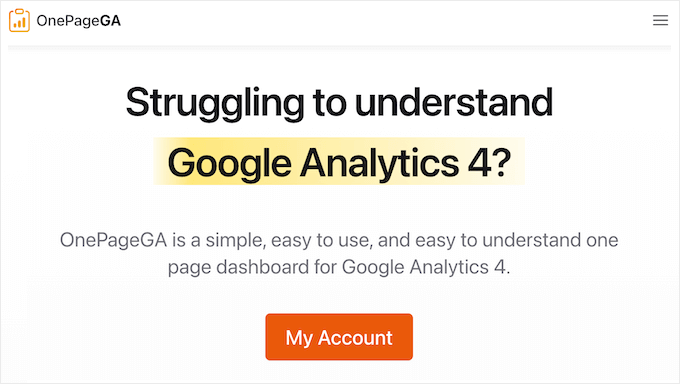
OnePageGA Review: Why Use It in WordPress?
Let’s start from the top: OnePageGA is a straightforward, one page dashboard for Google Analytics 4. It shows all your site’s essential analytics in a single, easy-to-understand view so you can identify trends, spot opportunities, and pinpoint potential problems at a glance. Even better, you can do all this without having to grapple with complex tables or graphs.
As soon as you open OnePageGA, you’ll see a visual graph with your site’s page views, sessions, session duration, bounce rate, and other important metrics.
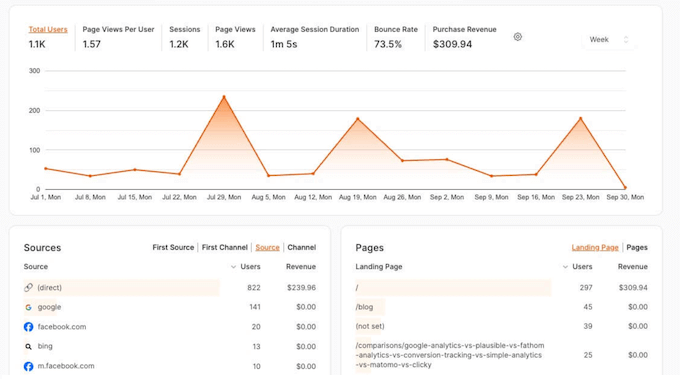
You can also see your traffic sources, most popular pages and landing pages, referrals from organic search, and similar information.
Getting started is a breeze. Just sign up using your existing Google account, and OnePageGA will automatically pull in all your data using the Google Analytics API. It will then generate all its reports automatically, saving you a ton of time. No more manual report building!
In this way, you can get real time insights from Google Analytics 4, without having to navigate between lots of different dashboards, reports, and unfamiliar metrics.
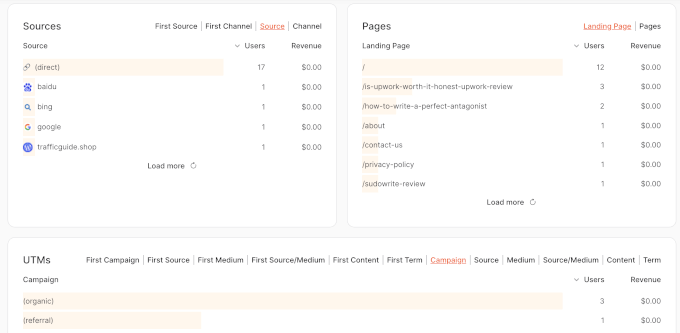
OnePageGA Review: Is It the Right GA4 Dashboard for You?
Understanding your website traffic is essential to growing a successful blog, website, or any kind of online business. However, getting those insights from Google Analytics isn’t always easy, especially with the launch of GA4. It’s a LOT!
If you’re feeling overwhelmed by GA4, OnePageGA might be just what you need. With that said, is OnePageGA the right analytics solution for you? That’s what we’re here to find out, in this OnePageGA review.
1. Easy to Set Up
It’s easy to get started with OnePageGA. Just sign up for a free trial using your Google account, pick the GA4 property you want to use, and boom! You’re done. OnePageGA takes care of the rest, generating a dashboard with all your latest GA4 data.
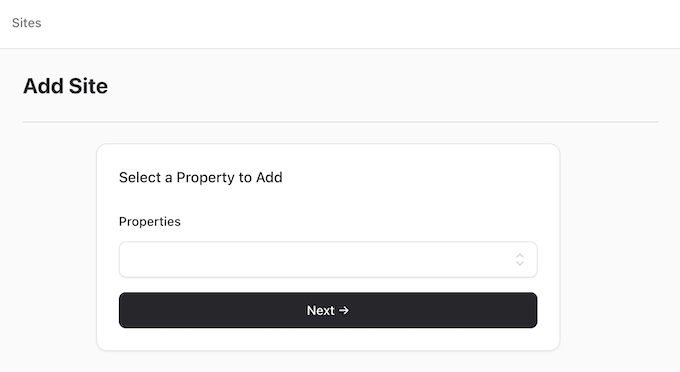
The best part? It automatically focuses on the metrics that actually matter for your website’s success and growth. No more sifting through a mountain of irrelevant data! This means you can concentrate on the numbers that have a real impact on your goals and make smarter, data-driven decisions without any extra setup or configuration.
So, you can spend less time wrestling with complicated settings and more time actually analyzing your data and acting on those valuable, actionable insights. Who doesn’t want that?
All that to say, you can spend more time analyzing your data and getting actionable insights, rather than wresting with a complicated setup and configuration.
2. Unlimited Pageviews
Now, a lot of analytics tools out there charge you based on the number of pageviews your site gets. This can get really expensive as your website grows and your traffic increases.
The good news is that OnePageGA doesn’t play that game. You get unlimited pageviews without any extra charges, so you can continue to use exactly the same plan no matter how big your website gets.
3. One-Page Analytics Overview
One of the things I love about OnePageGA is how it presents all your key website metrics in a single, streamlined view. I get exactly the information I need, all in one place. No more jumping between different reports or digging through endless menus!
Essentially, you’ll spend less time navigating between dashboards and more time on what really matters – using GA4’s data to grow your online business.
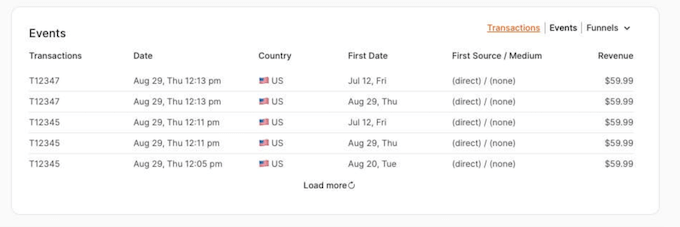
4. Over 25 Pre-Built Reports
OnePageGA makes it super easy to get started with GA4, even if you’re a complete newbie. It comes with over 25 pre-built reports that are designed to provide actionable insights, fast. These reports focus on the key performance indicators that matter most, such as your top sources, channels, landing pages, and locations. In this way, you can get instant insights and make informed decisions on the fly.
And here’s what makes it even better: you can click on any of these reports to see the number of users and the revenue associated with each data point.
5. Add Unlimited Notes
OnePageGA has a really neat feature that can help you understand your data better: notes! You can add notes directly to your graphs and tag them with specific dates.
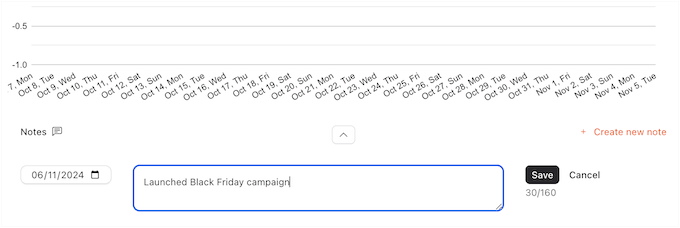
This is super helpful for annotating any dramatic changes in your analytics. For example, let’s say OnePageGA shows a sudden spike in traffic. You could add a note right there on the graph explaining that you launched a new sales page on that date, or started a Google Ad campaign. This way, when you’re analyzing your data later, you’ll have that extra context to understand what caused the change.
6. eCommerce Tracking
Running an online store? Then you need eCommerce tracking!
You can see your top-selling products, most valuable traffic sources, where your customers are located, and a whole lot more. Armed with that knowledge, you can make smarter decisions to boost your sales and make more money.
The good news is that OnePageGA has you covered. It includes eCommerce data right out of the box, making it perfect for anyone running a WooCommerce or similar store.

You can also create custom sales funnels and then track that data in a dedicated report.
Just tell OnePageGA which pages and events you want to track, and it’ll instantly create the report for you. It’s that easy!
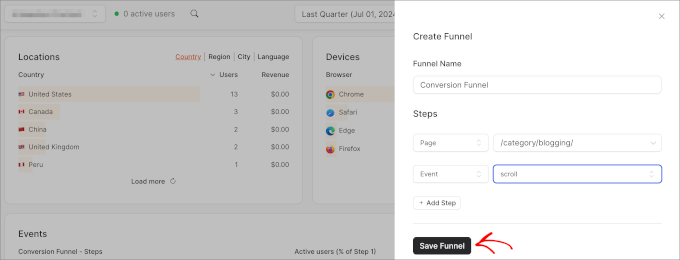
7. Compare and Contrast Time Periods
Ever wonder how your website’s doing now compared to, say, last month or last year? Comparing your performance across different time periods can reveal some really interesting trends and opportunities.
With OnePageGA, you can compare multiple periods, to evaluate how your site’s performance has changed over time.
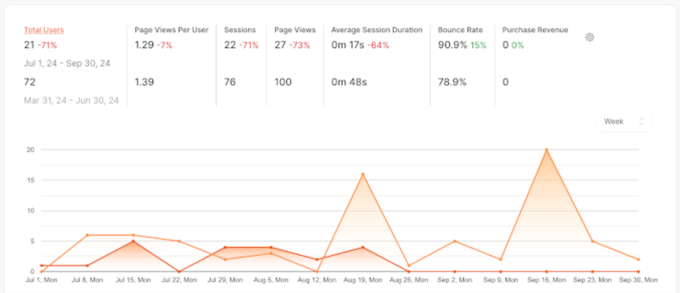
8. Filter By Dimension
In Google Analytics 4, a dimension is an attribute or characteristic that describes your data, such as ‘Device Category’ or ‘Country.’ It’s a way to categorize things.
With OnePageGA, you can filter your data by any dimension. Easy peasy! It’s all about getting the insights that are most relevant to you.
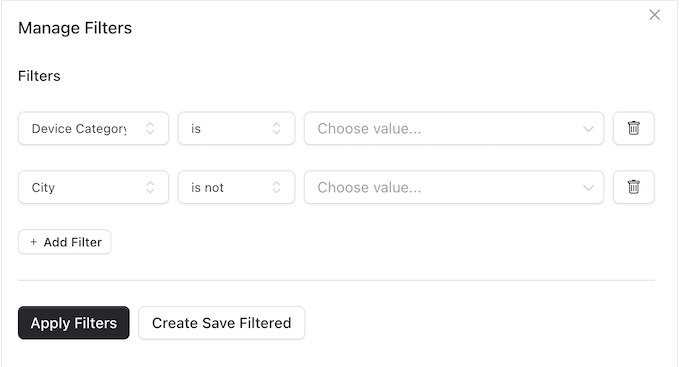
9. Custom GA4 Reports
OnePageGA’s pre-built reports are a great starting point for all kinds of WordPress blogs, websites, and online stores. But what if you want to track something different? No problem! OnePageGA lets you customize which metrics to include in your reports.
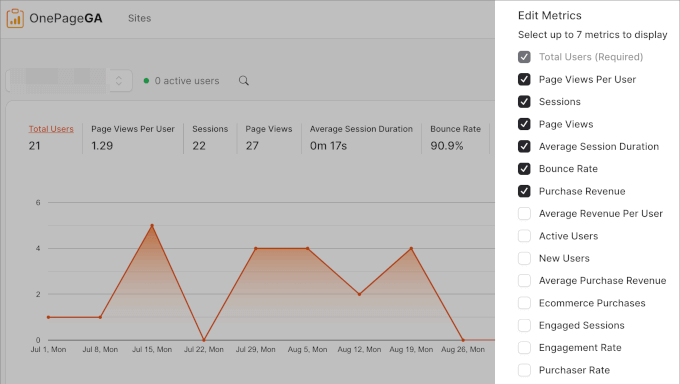
You can select up to 7 metrics to display including average revenue per user, eCommerce purchases, engagement rate, and active users. Simply select each metric you want to track and OnePageGA will create a custom report containing exactly the information you need. It’s all about making your analytics work for you.
10. UTM and Campaign Tracking
Ever heard of UTM parameters? They’re special tags you can add to URLs in order to pass important information to Google Analytics. For example, you might track visitors from a particular ad, email newsletter, tweet, SMS campaign… you name it!
If you use UTM parameters, then you’ll be happy to learn that you can track all those parameters directly in the OnePageGA dashboard. It’s a convenient way to see how your different campaigns are performing and get a clear picture of where your traffic is coming from.
11. Event and Goal Tracking
A lot of business owners get caught up in basic metrics like pageviews, referral sources, and time spent on page. Those are important, no doubt. But I always recommend taking things a step further with event tracking.
Event tracking gives you a much deeper understanding of how users are actually interacting with your website. You can see where they’re clicking, which videos they’re watching, what forms they submit… it’s incredibly valuable information.
And the best part? You can easily set up event tracking in WordPress and then see that information in your OnePageGA dashboard.
12. Built-in Dark Mode
Ever worked late at night or in a dimly lit room and felt that strain on your eyes from your computer screen? Or maybe even a headache? Yeah, that bright light can be tough on the eyes. Some folks even think it messes with your sleep by disrupting your natural circadian rhythms.
With that said, many apps, websites, and even operating systems come with a built-in dark mode that reduces the amount of light coming from the screen. Going further, many website owners enable dark mode for their WordPress admin dashboard, or even add a dark mode to their website’s front-end.
If you’re a fan of dark mode, then you’re in luck! OnePageGA comes with a built-in dark mode, so you can make its reports and dashboard easier on the eyes.
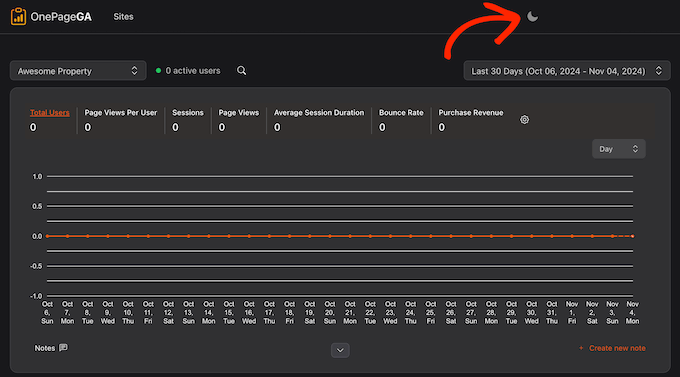
13. Community and Professional Support
OnePageGA is all about simplicity. It’s designed to help you track user engagement, traffic, and other key metrics without having to wrestle with complicated reports or graphs. It works right out of the box, so you can just create an account and instantly access that convenient one-page dashboard. Easy peasy!
But, let’s be real, Google Analytics is a powerful business tool, so you’ll want to squeeze every last drop of insight out of it, right? With that said, OnePageGA has an FAQ section that answers some of the key questions users have asked.
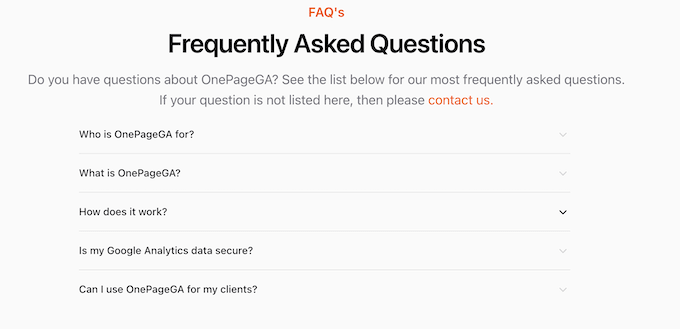
If you have a different question, then you can fill in the contact form and a member of the OnePageGA team will get back to you as quickly as possible.
Or, even better, you can send your questions directly from the OnePageGA dashboard. It’s super convenient.
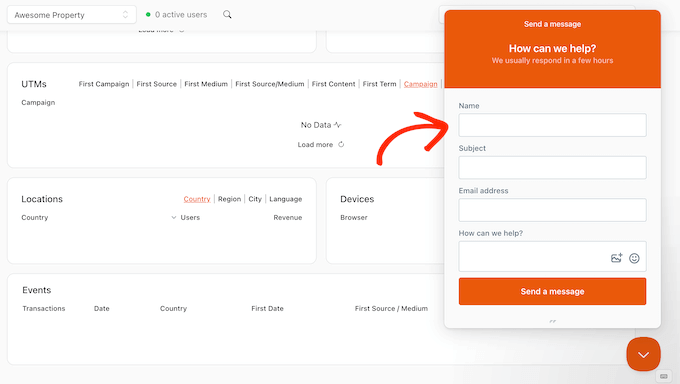
Need some tips on getting the best WordPress support? We’ve got a detailed guide on how to ask for WordPress support and get it. Check it out!
OnePageGA Review: Pricing and Plans
Want to take OnePageGA for a spin before committing? No problem! They offer a 14-day free trial. Just sign up using your Google account, no credit card required. After the trial, you can easily upgrade to one of their paid plans if you like what you see.
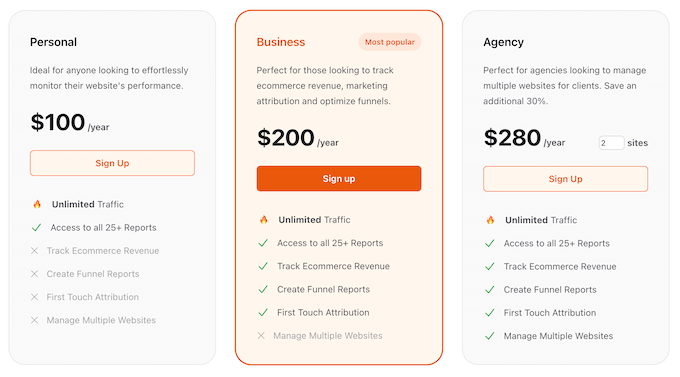
No matter what plan you buy, you get unlimited pageviews and over 25 reports. But there are some key differences between the plans:
- Personal. For $100 per year, this plan supports unlimited traffic and comes with 25+ reports. With that said, I think this is a great plan if you run a WordPress blog, or you’re starting a side business with a limited budget.
- Business. Priced at $200 annually, the Business plan adds some serious firepower for online stores. You get eCommerce tracking so you can see exactly what’s happening across your online store. You can also build custom funnel reports to understand and optimize the customer journey, and even pinpoint where people are dropping off. Finally, the Business plan records first touch attribution so you can identify the original source that brought each visitor to your site. If you’re running an eCommerce site or want to grow your small business website quickly, then this is the plan for you.
- Agency. This one’s for the WordPress development agencies and multi-site managers out there. This flexible plan lets you track and manage multiple websites from a single OnePageGA account. When buying your plan, simply enter the number of websites you manage and OnePageGA will change the price accordingly. This typically works out much cheaper, compared to buying multiple separate OnePageGA plans.
OnePageGA Review: Is It the Right GA4 Dashboard for You?
To wrap up this OnePageGA review, I can confidently say it’s a truly user-friendly Google Analytics tool that presents your data in a clear, straightforward way. It’s simple and easy to understand, similar to how Google Analytics used to be.
Right out of the box, OnePageGA shows you the metrics that are most important for business growth. But, and this is key, you can easily customize those metrics to display exactly the data that matters most to your business.
I hope this OnePageGA review helped you decide whether it’s the right Google Analytics dashboard for you. Next, you may want to see our guide on how to increase your blog traffic, or see our expert pick of the must have WordPress plugins.
If you liked this article, then please subscribe to our YouTube Channel for WordPress video tutorials. You can also find us on Twitter and Facebook.

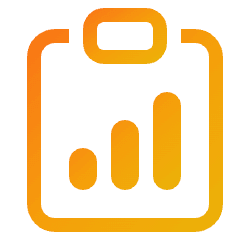

OnePageGA User Reviews
Please share your OnePageGA review to help others in the community.